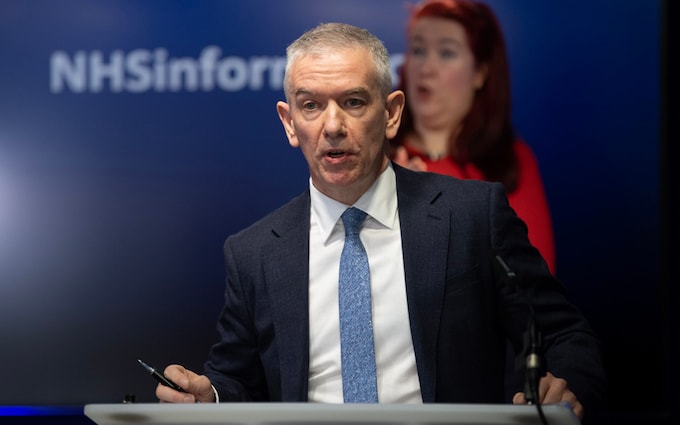
Prof Sir Gregor Smith,chief medical officer for Scotland,has not yet agreed to Cass Review reforms
Credit: Lesley Martin/Getty
Scotland’s most senior doctors are demanding that the SNP government follow the Cass Review and adopt the “English model”,in a row over gender services for children.
The Telegraph can reveal that the medical directors of Scotland’s two largest health boards have urged Prof Sir Gregor Smith,chief medical officer,to adopt the findings of Hilary Cass,the esteemed paediatrician.
However,correspondence reveals Sir Gregor,under pressure from trans activists to reject the landmark scientific review,has so far refused.
It has also emerged that medical directors’ called for an independent review into evidence around puberty blockers in 2022 after they raised safety concerns.
Sir Gregor only agreed to pause new prescriptions of the drugs for under-18s in April this year,after the boards said they would implement their own ban. They had warned him that a failure to “align with the position taken by NHS England” would present a “significant risk”.
Campaigners said this was further evidence that experts were being sidelined in the Scottish NHS,with trans rights activists handed positions of influence by the SNP government.

The findings of the Cass Review have been rubbished by trans activists
Credit: Yui Mok/PA
“The most senior clinicians in Scotland could not be clearer that Scotland must follow the science and implement the findings of the Cass Review,” Trina Budge,a director at campaign group For Women Scotland,said.
“Yet they have been repeatedly fobbed off by the chief medical officer,who had to be bounced into a belated ban on puberty blockers.
“It is time for Sir Gregor to finally grow a backbone,stand up to the ideologues and do the right thing for children across Scotland.”
They said there was a “strong clinical consensus” that English guidelines should be adopted in Scotland,as part of a specification for a new national child gender service.
However,Sir Gregor has refused to agree to the clinicians’ demand to adopt the English model for a new specification for reformed child gender services in Scotland.
He highlighted “historical differences in clinical approaches in this field” between Scotland and England and said,“such a decision should be taken only after full consideration of its potential implications”.
The medical directors also advised Sir Gregor in late March that they would be suspending the use of puberty-blocking drugs for new child patients.
Sir Gregor formally signed off on the suspension of puberty blockers and gender-affirming hormones for children a fortnight later,on April 9,the day before the final Cass Review was published. The move was not announced publicly until April 18.
The health boards had requested in Oct 2022 that Sir Gregor order an independent review of the evidence for puberty blockers and hormone treatments for children.
She found that evidence for prescribing puberty blockers,given to children as young as nine in Scotland,was “remarkably weak” and highlighted evidence they could lead to serious health problems in later life.
Her findings have been opposed by trans rights activists who argue that children who say they are trans should always be given “affirming” healthcare and supported to transition socially.
The activists,some of whom have been given formal roles in the Scottish Government’s national gender identity healthcare reference group,have attempted to rubbish Dr Cass’s findings.
Other members of the group have used their positions to spread disinformation within NHS Scotland about Dr Cass’s findings,saying her report promotes “conversion therapy” and was “built on a foundation of prejudice”.
Sir Gregor has set up a group to review Dr Cass’s findings and had promised that it would publish an update by this month. However,SNP ministers have reneged on their pledge to update MSPs by next week,blaming the general election.
The Scottish Government said that Sir Gregor had asked Healthcare Improvement Scotland to review evidence around puberty blockers,which was published in July last year.
A spokesman added: “The chief medical officer made clear in his response to medical directors in NHS Greater Glasgow and Clyde and NHS Lothian that he was supportive of decisions taken by health boards via agreed local clinical governance processes to review and revise current care pathways and to consider new and emerging evidence in a clinical field.
“However he has also highlighted that these decisions should be taken only after full consideration of potential implications – which may require consideration of legislative and/or structural differences between NHS England and NHS Scotland and that any decision to substantively amend a clinical offering for a service serving all NHS Scotland would likely benefit by following relevant NHS Scotland structures to reach collective agreement.”

English Morning News: Your Source for Regional News and Corporate
© English Morning News
Privacy Policy